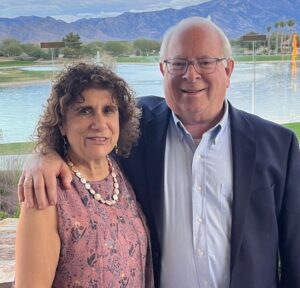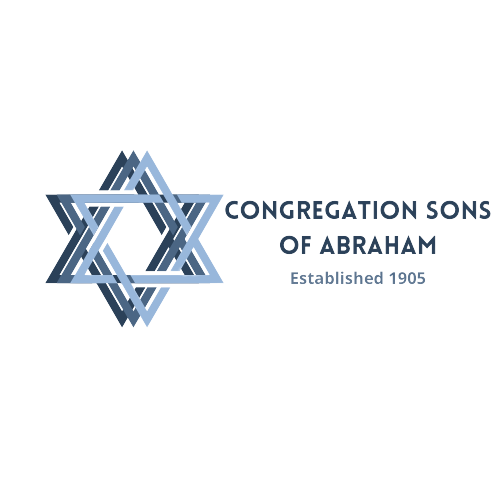
New Year’s Message from Rabbi Brian
Happy New Year! What kind of year will 2024 be for you?
I know…I know. You will tell me that we Jews already went through this self-evaluation, this soul-searching back during the High Holy Days in September. Still, it’s a milestone, and a good time to look back at 2023, and look forward to a new year.
For many of us, we have a hard time imagining what it was like before October 7. For many of us American Jews, this was our 9/11. In our small Jewish family, this was the worst massacre of Jews since the last years of the Holocaust, the last years of the second World War. For me, I have felt a lot like it must have felt for American Jews living in the U.S. during the Holocaust – helpless!
At this time last year, Israel was torn between two camps – Binyamin Netanyahu’s far-right governing coalition and the huge sector of Israel’s population who opposed it. Every Saturday night, after Shabbat ended, hundreds of thousands of Israeli citizens took to the streets and freeways to protest the direction the country was headed. They voted with their feet – the marchers demanded that the government back off its attempt to usurp most of the power of the Israeli supreme court – a move that could allow them to control all law-making with no checks or balances, a far cry from democracy.
Those weekly demonstrations threatened to tear Israel apart. Worse, many young Israelis saw the handwriting on the wall, and headed to Europe and the U.S. to build their high-tech futures. Jews all over the world could not see an end to the government’s power grab or the huge public outcry against it. This machloket was also taking its toll on the relationship between us Jews in the Diaspora and our Israeli brothers and sisters.
We were finally recovering from the worst of the COVID-19 pandemic, returning to normal times at work, school, in our synagogues. For many, the challenge of COVID brought our Jewish communities together better, stronger, warmer and more open. For us, building an online presence for religious services and adult education made us stronger, and extended our following.
Antisemitism was still growing, but at a slower pace. Our outreach to our interfaith communities seemed to be paying off. The economy was recovering and inflation was slowing down. Tourism to Israel, Birthright and other trips resumed. 2023 looked like it was going to be a good year.
Then, October 7 happened. It was a shock to our system, a vicious massacre on a Jewish holiday. For those of us who were around in 1973, this was not unlike the launching of the war against Israel on our holy day of Yom Kippur.
Again, it appeared Israel’s military and intelligence communities were caught totally unawares. Nobody expected Hamas to attack at all, let alone on a Jewish holy day.
The result was the devastation of 22 southern Israel communities, and some army bases, with over 1,300 dead, thousands injured and hundreds taken hostage. What was different this time from the thousands of other terrorist attacks was that the hostages were not just soldiers or army-age Israelis, but many were babies and even elderly in wheelchairs. Children were slaughtered or burned in the arms of their loving parents. The viciousness of the attacks – the shock and the terror were unprecedented in modern times.
Immediately, Jewish communities like ours were contacted by our local interfaith leaders. Churches and mosques reached out to us. How can they help? How can they support us in our time of need? Where can they send money? How should they pray for us?
In our small city, a big turnout at a local church rally showed us the support of our neighbors, a genuine desire to stop a war immediately after it started. This support has not waned since October 7, but has only gotten stronger. People stop me in the local food stores and at the gas station, “Rabbi, we are praying for the Jews in Israel”, “Rabbi, what can we do to help?” I have been asked to appear on local TV stations, and I have spoken at a dozen churches.
The (perhaps) unexpected wave of anti-Israel and anti-Jewish hate speech continues to flow throughout our society, here in the US and all over the world. The venom is unprecedented from all quarters – from the UN to the streets of the US and many foreign cities, and on many of our college campuses.
The difference this time around is the social media. Given this free and easy access to a worldwide platform, the haters have gathered a huge following. The lies and misinformation about Israel’s actions to defend itself are repeated daily. Any other democracy in the world would react in the same or even more powerful way. Unlike many armies, the IDF goes out of its way to warn innocent civilians and get them out of harm’s way.
What was not expected was the huge increase in anti-Israel and anti-Jewish hate speech in so many venues. Certainly the antisemitism online on many social media platforms, but especially on college campuses. This is what I heard on my recent visit to UW-Madison’s Hillel, the Jewish home-away-from-home for many students. Many Jewish students have said they are afraid to display their mezuzot on their dorm room doorways, or to wear a star of David or a mezuzah, or to wear a kippah in public, or to speak up to defend Israel in a classroom discussion. They have been censured in class while expressing support for Israel, to the point that many no longer speak up.
Many college administrations have done a poor job of standing up to professors or student groups who express their hatred for Israel or Jews, or both.
I am asked what people can do to offset all this negativity, both in person and online. How can we defend ourselves from unrelenting hate speech? I tell my congregation, I tell the church parishioners, I tell the visiting college students and school groups – the only way to defeat hate is through LOVE. This is a message that gets through to our neighbors. Loving your neighbor is (almost) a universal belief. But putting that love into practical positive behaviors and good works demands constant reminders and continuous nurturing.
So, what kind of year will 2024 be for us? As a Jewish community, we are becoming more and more vigilant about threats to our families and our institutions. We are coordinating more than ever with our local police, the local FBI, and regional Jewish institutions. We are working harder to build coalitions of interfaith communities to emphasize our common goals for a peaceful society, with opportunities for all. This will be a great time to focus on our shared values, shared morals and shared Scripture.
We hope that your 2024 will be a year of increased security and happiness, greater love for your family and your community, filled with health, prosperity and safety.
Renana and I want to wish you a very Happy, Prosperous and Safe New Year!
Rabbi Brian Serle and Renana Friedman
